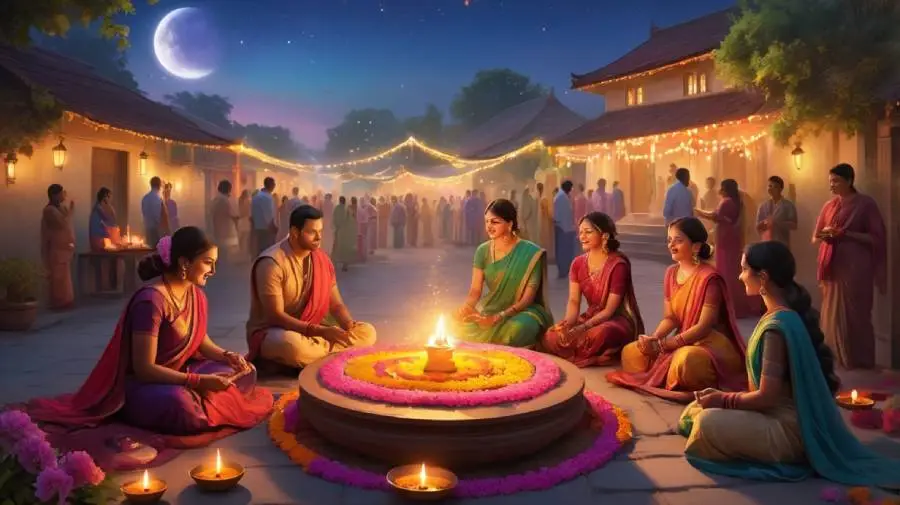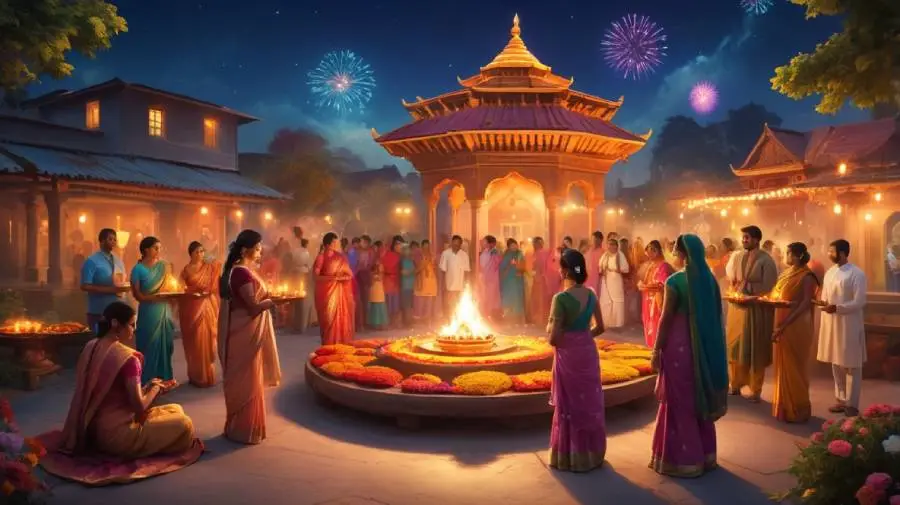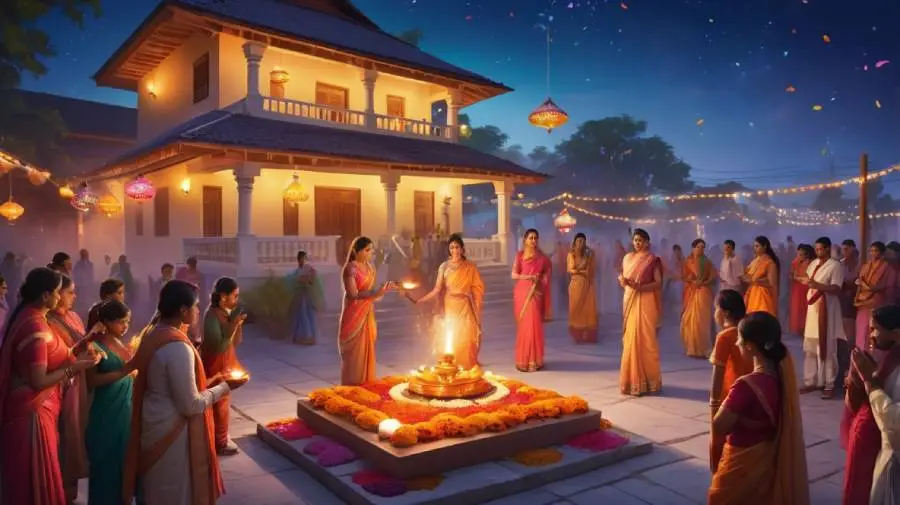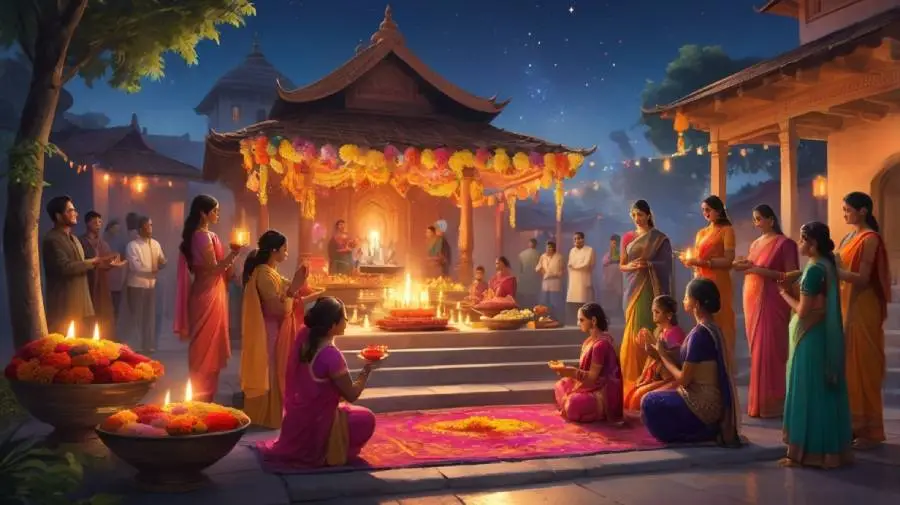The Ultimate Guide to Diwali 2024 & 2025: Celebrations, Traditions, and Significance
Diwali, also known as the Festival of Lights, is one of the most cherished festivals celebrated not just in India but across the world. This vibrant five-day festival, which falls between October and November each year, signifies the triumph of good over evil and light over darkness. In 2024, Diwali will fall on October 31st, and the following year, the festival will be celebrated on October 21, 2025. While Diwali’s essence remains the same every year, the customs, rituals, and celebrations continue to evolve, making this occasion even more special for millions of people globally.

- Tuesday, 21 October 2025
- Monday, 09 November 2026
- Friday, 29 October 2027
- Wednesday, 18 October 2028
What is Diwali?
Diwali, also called Deepawali, is a celebration of light, knowledge, and goodness. The festival, predominantly observed by Hindus, is a time when families and communities come together to honor their cultural traditions. The word Deepawali translates to “a row of lights,” which perfectly captures the essence of the festival. The celebrations involve lighting oil lamps or diyas, decorating homes, and offering prayers to various deities, especially Goddess Lakshmi, who is associated with wealth and prosperity.
Diwali Dates in 2024 and 2025
- Diwali 2024: The festival will start on October 31st, 2024, at 3:52 PM, and continue until November 1st, 2024, at 6:16 PM.
- Diwali 2025: The festival will fall on October 21st, marking another year of joyous celebrations.
The Five Days of Diwali
Diwali is not just a one-day festival but spans five days, each with its unique significance and customs.
1. Dhanteras (Day 1)
The first day of Diwali, known as Dhanteras, is a time to honor wealth and prosperity. On this day, people purchase gold, silver, and utensils as a symbol of good luck and fortune. It’s also the day to worship Lord Dhanvantari, the god of health and medicine.
2. Choti Diwali (Naraka Chaturdashi) (Day 2)
Choti Diwali, or Naraka Chaturdashi, is the day before the main Diwali celebration. This day commemorates Lord Krishna’s victory over the demon Narakasura. On this day, people clean their homes and light small oil lamps or diyas to ward off evil spirits and invite positive energy into their lives.
3. Diwali (Day 3)
The third day of Diwali is the main celebration. On this day, homes are decorated with diyas and rangolis, and families worship Goddess Lakshmi and Lord Ganesha to seek blessings for wealth and prosperity in the coming year. Diwali also marks the darkest night of the lunar month, symbolizing the victory of light over darkness.
4. Bali Pratipada (Govardhan Puja) (Day 4)
The fourth day of Diwali, also known as Bali Pratipada, is a celebration of Lord Vishnu’s victory over the demon king Bali. This day marks the beginning of the new year in some parts of India, where people exchange gifts and wishes for a prosperous year ahead.
5. Bhai Dooj (Day 5)
The final day of Diwali is dedicated to celebrating the bond between brothers and sisters. Sisters apply a tilak (vermilion mark) on their brothers’ foreheads, pray for their well-being, and offer gifts. In return, brothers promise to protect and support their sisters.

Diwali: A Festival Rooted in Mythology and History
The origins of Diwali can be traced to ancient Hindu texts like the Skanda Purana and Padma Purana. These texts mention Diwali as a festival celebrating the cosmic energy of the sun during its transition in the month of Kartika.
The Ramayana Connection
The most popular legend behind Diwali is tied to the Ramayana. The story revolves around Lord Rama’s return to his kingdom of Ayodhya after defeating the demon king Ravana. The people of Ayodhya celebrated his return by lighting lamps and fireworks to illuminate the city, symbolizing the victory of good over evil and light over darkness.
Other Legends
- In South India, Diwali commemorates Lord Krishna’s victory over Narakasura.
- In West Bengal, the festival is celebrated as Kali Puja, where people worship Goddess Kali to seek her blessings for strength and protection.
- For Jains, Diwali marks the nirvana of Lord Mahavira, while for Sikhs, it honors the release of Guru Hargobind Ji from imprisonment.

Diwali Traditions and Rituals
The customs and rituals of Diwali are rich in symbolism and meaning. Here are some of the key traditions observed during the festival:
1. Cleaning and Decorating Homes
Before Diwali, people thoroughly clean and renovate their homes. This is because a clean and well-decorated house is believed to attract blessings from Goddess Lakshmi.
2. Lighting Diyas and Lamps
Lighting oil lamps (diyas) is the most significant tradition during Diwali. These lamps are placed around homes, streets, and temples to signify the victory of light over darkness and good over evil.
3. Rangoli Designs
Another common tradition during Diwali is creating intricate rangoli designs, which are decorative patterns made using colored powders, flowers, or rice. These designs are often placed at the entrance of homes to welcome guests and invite positive energy.
4. Wearing New Clothes
It is customary to wear new clothes during Diwali, as it is believed to bring prosperity and good fortune for the coming year.
5. Fireworks and Firecrackers
While fireworks and firecrackers are a traditional part of Diwali celebrations, there is growing awareness of their environmental impact. Many people now prefer quieter and eco-friendly alternatives to minimize pollution.
6. Family Gatherings and Feasts
Diwali is a time for family gatherings, feasts, and the exchange of gifts and sweets. People also donate to charity, extending their blessings to those in need.

The Spiritual Significance of Diwali
While Diwali is often celebrated with grandeur, it is also a deeply spiritual occasion. The core message of the festival is the triumph of light over darkness, both in the external world and within ourselves. Diwali encourages us to reflect on our actions, seek wisdom, and embrace goodness in our lives.
- Inner Light: Just as we light diyas to dispel darkness, Diwali reminds us to cultivate inner light through wisdom, love, and kindness.
- Spiritual Cleansing: The festival calls for introspection, where people purify their minds and hearts, letting go of negative thoughts and actions.
- Sharing Joy: Diwali fosters a spirit of togetherness, where people from different backgrounds unite to celebrate the common theme of light and goodness.
Eco-Friendly Diwali: Celebrating with Care for the Planet
In recent years, there has been a growing concern about the environmental impact of Diwali celebrations. The noise and pollution caused by fireworks have led many to adopt eco-friendly Diwali practices.
- Green Diwali: People are now opting for quieter and less harmful fireworks, while others have turned to eco-friendly decorations, such as clay diyas and biodegradable rangolis.
- Sustainable Gifts: Instead of plastic or synthetic gifts, many people are choosing sustainable alternatives like handmade crafts, organic foods, or plant-based gifts.
Diwali, the Festival of Lights, is a celebration that transcends religious boundaries and brings people from all walks of life together. Whether it’s the joyous lighting of diyas, the sharing of sweets, or the deep spiritual significance, Diwali symbolizes hope, renewal, and the eternal victory of light over darkness. As we move into the future, it is essential to honor this festival while being mindful of its impact on our environment, ensuring that this cherished tradition continues for generations to come.
FAQs
1. What is the meaning of Diwali? Diwali, or Deepawali, is the Festival of Lights, symbolizing the victory of good over evil and light over darkness.
2. Why is Diwali celebrated? Diwali is celebrated to mark various legends, the most prominent being Lord Rama’s return to Ayodhya after defeating Ravana, and the victory of good over evil.
3. How many days does Diwali last? Diwali lasts for five days, with each day having its own significance and rituals.
4. Is Diwali celebrated worldwide? Yes, Diwali is celebrated by millions of people worldwide, including in India, Nepal, Sri Lanka, Singapore, Malaysia, and among the Indian diaspora globally.
5. How can I celebrate an eco-friendly Diwali? To celebrate an eco-friendly Diwali, opt for sustainable decorations, use eco-friendly fireworks, and avoid plastic gifts. You can also focus on charity and family gatherings.


